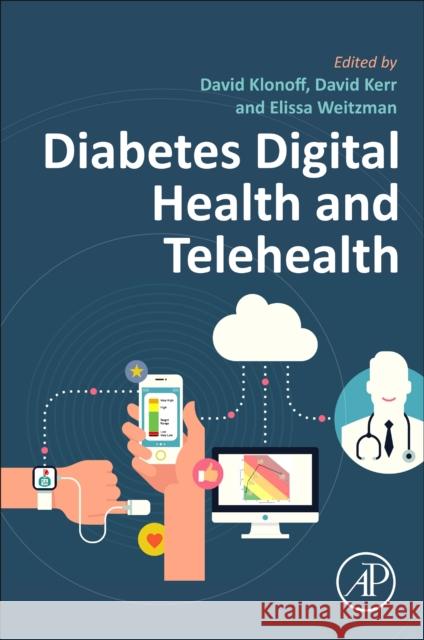Diabetes Digital Health and Telehealth » książka



Diabetes Digital Health and Telehealth
ISBN-13: 9780323905572 / Angielski / Miękka / 2022
Diabetes Digital Health and Telehealth
ISBN-13: 9780323905572 / Angielski / Miękka / 2022
(netto: 535,33 VAT: 5%)
Najniższa cena z 30 dni: 556,35
ok. 16-18 dni roboczych.
Darmowa dostawa!
Wydanie ilustrowane
Part I: Building digital health and telehealth tools for diabetes 1. Democratizing access to and understanding of health information in the era of telehealth David Kerr and Namino Glantz 2. Building digital health tools for diabetes: how user interface research and user experience design can improve digital health adoption Amy Oughton 3. Incorporating diabetes technology data into the EHR Juan Espinoza 4. Interoperability risks and health informatics Anura S. Fernando 5. Cybersecurity in the diabetes care ecosystem Axel Wirth 6. Privacy and diabetes digital technologies and telehealth services Elissa R. Weitzman and Melanie Floyd 7. Telehealth and digital health privacy regulations Randi Seigel, Scott T. Lashway, Matthew M.K. Stein and C.J. Rundell 8. Business considerations in starting a diabetes digital health company David J. Kim
Part II: Diabetes digital health and telehealth for individuals 9. Digital health apps for people with diabetes Joi Hester, Zohyra Zabala, Kate Winskell and Francisco J. Pasquel 10. Telehealth for diabetes: a durable, evolving solution Michelle L. Griffith and Leslie Eiland 11. Digital health and telehealth for behavior change in diabetes Michelle L. Litchman, Julia E. Blanchette, Cherise Shockley and Tamara K. Oser 12. Digital support for physical activity Sheri R. Colberg and Gary Scheiner 13. Psychosocial responses to telehealth for diabetes care Shideh Majidi and Jennifer K. Raymond 14. Remote blood pressure monitoring Trisha Shang, Jennifer Y. Zhang, Dessi P. Zaharieva and David C. Klonoff 15. Digital health and telehealth for pregnancy Mercedes Rigla Cros, M. Elena Hernando and Gema Garci´a-Sa´ez 16. Digital health technologies for patients in diabetes self-management education and support Shiyu Li and Jing Wang
Part III: Diabetes digital health and telehealth for populations 17. Use of digital health and telehealth in the US David T. Ahn 18. Diabetes digital health and telehealth in the Middle East Mohammed E. Al-Sofiani 19. An Asian perspective on digital health for diabetes Lauren Hartz and Kayo Waki 20. Impact of digital technology on managing diabetes in the hospital Sara Donevant, Urooj Najmi, Umair Ansari, Waqas Haque and Mihail Zilbermint 21. Disparities in digital health in underserved populations Celeste Campos-Castillo and Lindsay S. Mayberry 22. Telehealth for training diabetes professionals Sean M. Oser and Tamara K. Oser 23. Outcomes assessment for digital health interventions in diabetes: a payer perspective Jordan Silberman, Siavash Sarlati, Manpreet Kaur and Warris Bokhari
Dr. David C. Klonoff, MD, FACP, FRCP (Edin), is an endocrinologist specializing in the development of diabetes technology. He is Medical Director of the Dorothy L. and James E. Frank Diabetes Research Institute of Mills-Peninsula Medical Center in San Mateo, California and a Clinical Professor of Medicine at UCSF, USA. Dr. Klonoff received the American Diabetes Association's 2019 Outstanding Physician Clinician Award. He has received an FDA Director's Special Citation Award for outstanding contributions related to diabetes technology. He is the Founding Editor-in-Chief of Journal of Diabetes Science and Technology and co-founded the Digital Diabetes Congress. He chairs the Scientific Advisory Board for the Texas A&M University Precise Advanced Technologies and Health Systems for Underserved Populations (PATHS-UP) Engineering Research Center. He is currently researching new devices and drugs for diabetes. Dr. Klonoff graduated from UC Berkeley and UCSF Medical School and did five years of internal medicine and endocrinology training at UCLA and UCSF. Dr. David Kerr is Director of Research and Innovation at Sansum Diabetes Research Institute, Santa Barbara, and Director of Digital Services for the Diabetes Technology Society. Previously he was Consultant Physician in Internal Medicine and Endocrinology at the Bournemouth Diabetes and Endocrine Centre in the UK. His research and innovation continue to focus on the use of technology for diabetes care and also the new area of digital health. He is co-founder of the annual Digital Diabetes Congress and recently launched a major long-term initiative to reduce the burden of diabetes for an underserved population in the United States through the creation of an innovative long-term cohort study (Mil Familias). He is also lead investigator in a program exploring the value of food as medicine through the use of medical prescriptions of vegetables for adults with or at risk of type 2 diabetes (Farming for Life). Dr. Elissa R. Weitzman is Associate Professor of Pediatrics at Harvard Medical School, and of Adolescent/Young Adult Medicine at Boston Children's Hospital. Her research focuses on improving the health of youth, with an emphasis on addressing chronic illness and behavioral health problems. A mixed-methods scientist, Weitzman uses narrative, cohort, and "big data passive or participatory surveillance methods to illuminate the epidemiology and experience of chronic illness. Recognizing population engagement with digital health tools and online disease communities, she has investigated willingness to share electronic data for research, quantified the quality and safety of online health communities, and tested informatics-enabled models for returning research data to cohorts to drive engagement. Weitzman has a Bachelor's from Brandeis University, a Masters and Doctorate from the Harvard TH Chan School of Public Health, and has completed post-doctoral training in Medical Ethics and Public Health in Psychiatry at the Harvard Medical School.
1997-2026 DolnySlask.com Agencja Internetowa
KrainaKsiazek.PL - Księgarnia Internetowa









